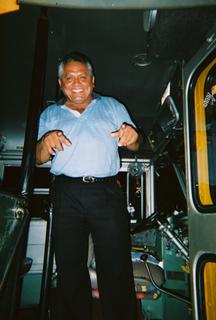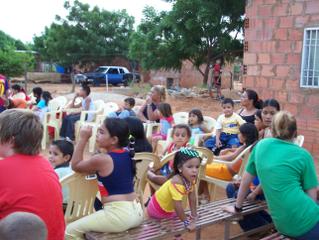Venezuelans
This post, I'll convey something of the spirit of the Venezuelan people.
 It may be a misconception that these are uneducated people. Literacy, as defined as people who can read and write over the age of 15, is reported to be over 93%. That's not bad at all. I found the Venezuelans to have a good sense of the world around them. I noticed that even poor children under 15 were able to spell. They are resourceful and mechanically inclined.
It may be a misconception that these are uneducated people. Literacy, as defined as people who can read and write over the age of 15, is reported to be over 93%. That's not bad at all. I found the Venezuelans to have a good sense of the world around them. I noticed that even poor children under 15 were able to spell. They are resourceful and mechanically inclined.
To this end, they take care of their automobiles. They may not be able to find the proper parts, but they have a knack for taking a similar part from another brand of vehicle and rigging it to work. You might see a classic Ford body with a Chevrolet engine, a Dodge transmission, Toyota power steering, and a smattering of replacement parts obtained according to what was available at the time.
On the roads are vehicles that range from the very old to the very new. There are mostly American cars, but imports from Asia and Europe can be found. On the same roads one can occasionally see a donkey pulling a cart with the driver often perched on the tongue of the cart next to the donkey. (Don't ask me how this works - I'm only reporting what I saw.)
 Speaking of roads - the traffic is astonishing. It appears to be some sort of agreed-upon chaos. They have traffic laws that are not enforced. As a result, there is an understanding how those laws are to be broken. I saw only one accident while I was there. This could be attributed to the fact that people drive with their horns - the louder the better. For example, when creating another lane in the middle of the road to pass a vehicle that is in one's way, a blast on the horn is a good idea. It lets people know where you are so they don't run into you.
Speaking of roads - the traffic is astonishing. It appears to be some sort of agreed-upon chaos. They have traffic laws that are not enforced. As a result, there is an understanding how those laws are to be broken. I saw only one accident while I was there. This could be attributed to the fact that people drive with their horns - the louder the better. For example, when creating another lane in the middle of the road to pass a vehicle that is in one's way, a blast on the horn is a good idea. It lets people know where you are so they don't run into you.
We had two busses. Bus drivers typically own their own busses. Our bus driver was Levi (pronounced Leh'-vee, like the mounds that hold back the water in New Orleans). He is a devout Christian and loved to worship to the music he let the ITAM staff play on the sound system on his bus. In the middle of traffic he would raise his hands and praise God. This was disconcerting given the chaotic traffic in the city of Maracaibo.
 What I learned most about the Venezuelans is that they are conscientious people. The place we went on Saturday was a poor rural area on the outskirts of Maracaibo. Throughout the neighborhood could be seen houses that look like they've been torn down and are sitting in empty lots. In actuality, they are new construction. The people have very little. Instead of saving money to build all at once, they will buy a few bricks at a time and set them in place as they have the means lest their brother borrow the money. Consequently, construction takes awhile. They will use whatever building materials they can find. They will raise seedlings from wild trees and plant them in their yards so they have shade from the hot sun. They know they have less than many others and are not always willing to allow photographs of their dwellings. It is regarded as respect to ask before photographing. Poloroids are a good thing to have since they may want a picture to keep.
What I learned most about the Venezuelans is that they are conscientious people. The place we went on Saturday was a poor rural area on the outskirts of Maracaibo. Throughout the neighborhood could be seen houses that look like they've been torn down and are sitting in empty lots. In actuality, they are new construction. The people have very little. Instead of saving money to build all at once, they will buy a few bricks at a time and set them in place as they have the means lest their brother borrow the money. Consequently, construction takes awhile. They will use whatever building materials they can find. They will raise seedlings from wild trees and plant them in their yards so they have shade from the hot sun. They know they have less than many others and are not always willing to allow photographs of their dwellings. It is regarded as respect to ask before photographing. Poloroids are a good thing to have since they may want a picture to keep.
to be continued...
 It may be a misconception that these are uneducated people. Literacy, as defined as people who can read and write over the age of 15, is reported to be over 93%. That's not bad at all. I found the Venezuelans to have a good sense of the world around them. I noticed that even poor children under 15 were able to spell. They are resourceful and mechanically inclined.
It may be a misconception that these are uneducated people. Literacy, as defined as people who can read and write over the age of 15, is reported to be over 93%. That's not bad at all. I found the Venezuelans to have a good sense of the world around them. I noticed that even poor children under 15 were able to spell. They are resourceful and mechanically inclined.To this end, they take care of their automobiles. They may not be able to find the proper parts, but they have a knack for taking a similar part from another brand of vehicle and rigging it to work. You might see a classic Ford body with a Chevrolet engine, a Dodge transmission, Toyota power steering, and a smattering of replacement parts obtained according to what was available at the time.
On the roads are vehicles that range from the very old to the very new. There are mostly American cars, but imports from Asia and Europe can be found. On the same roads one can occasionally see a donkey pulling a cart with the driver often perched on the tongue of the cart next to the donkey. (Don't ask me how this works - I'm only reporting what I saw.)
 Speaking of roads - the traffic is astonishing. It appears to be some sort of agreed-upon chaos. They have traffic laws that are not enforced. As a result, there is an understanding how those laws are to be broken. I saw only one accident while I was there. This could be attributed to the fact that people drive with their horns - the louder the better. For example, when creating another lane in the middle of the road to pass a vehicle that is in one's way, a blast on the horn is a good idea. It lets people know where you are so they don't run into you.
Speaking of roads - the traffic is astonishing. It appears to be some sort of agreed-upon chaos. They have traffic laws that are not enforced. As a result, there is an understanding how those laws are to be broken. I saw only one accident while I was there. This could be attributed to the fact that people drive with their horns - the louder the better. For example, when creating another lane in the middle of the road to pass a vehicle that is in one's way, a blast on the horn is a good idea. It lets people know where you are so they don't run into you.We had two busses. Bus drivers typically own their own busses. Our bus driver was Levi (pronounced Leh'-vee, like the mounds that hold back the water in New Orleans). He is a devout Christian and loved to worship to the music he let the ITAM staff play on the sound system on his bus. In the middle of traffic he would raise his hands and praise God. This was disconcerting given the chaotic traffic in the city of Maracaibo.
 What I learned most about the Venezuelans is that they are conscientious people. The place we went on Saturday was a poor rural area on the outskirts of Maracaibo. Throughout the neighborhood could be seen houses that look like they've been torn down and are sitting in empty lots. In actuality, they are new construction. The people have very little. Instead of saving money to build all at once, they will buy a few bricks at a time and set them in place as they have the means lest their brother borrow the money. Consequently, construction takes awhile. They will use whatever building materials they can find. They will raise seedlings from wild trees and plant them in their yards so they have shade from the hot sun. They know they have less than many others and are not always willing to allow photographs of their dwellings. It is regarded as respect to ask before photographing. Poloroids are a good thing to have since they may want a picture to keep.
What I learned most about the Venezuelans is that they are conscientious people. The place we went on Saturday was a poor rural area on the outskirts of Maracaibo. Throughout the neighborhood could be seen houses that look like they've been torn down and are sitting in empty lots. In actuality, they are new construction. The people have very little. Instead of saving money to build all at once, they will buy a few bricks at a time and set them in place as they have the means lest their brother borrow the money. Consequently, construction takes awhile. They will use whatever building materials they can find. They will raise seedlings from wild trees and plant them in their yards so they have shade from the hot sun. They know they have less than many others and are not always willing to allow photographs of their dwellings. It is regarded as respect to ask before photographing. Poloroids are a good thing to have since they may want a picture to keep.to be continued...





0 Comments:
Post a Comment
<< Home